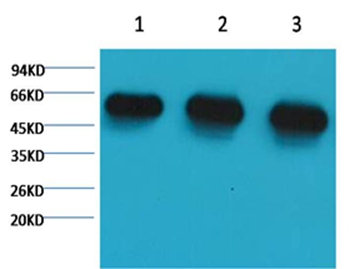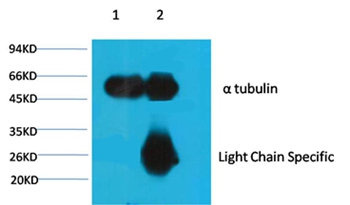


| WB | 咨询技术 | Human,Mouse,Rat |
| IF | 1/200 | Human,Mouse,Rat |
| IHC | 1/200 | Human,Mouse,Rat |
| ICC | 1/100-1/200 | Human,Mouse,Rat |
| FCM | 咨询技术 | Human,Mouse,Rat |
| Elisa | 咨询技术 | Human,Mouse,Rat |
| Aliases | TUBA1A;TUBA3;Tubulin alpha-1A chain;Alpha-tubulin 3;Tubulin B-alpha-1;Tubulin alpha-3 chain |
| Entrez GeneID | 7846; |
| WB Predicted band size | 52kDa |
| Host/Isotype | Rabbit IgG |
| Antibody Type | Primary antibody |
| Storage | Store at 4°C short term. Aliquot and store at -20°C long term. Avoid freeze/thaw cycles. |
| Species Reactivity | Human,Mouse,Rat |
| Formulation | Purified antibody in PBS with 0.05% sodium azide and 50% glycerol. |
+ +
以下是关于α-tubulin Mouse抗体的示例参考文献(文献信息为示例,实际引用需核对原文):
---
1. **"Monoclonal antibodies to α-tubulin: Characterization and use in studying microtubule dynamics"**
*Oakley BR, et al. (1983)*
摘要:开发并验证了小鼠来源的α-tubulin单克隆抗体,通过免疫荧光和免疫印迹证明其在研究有丝分裂和微管动态中的高特异性。
2. **"Immunolocalization of α-tubulin in neuronal cells using mouse monoclonal antibodies"**
*Gundersen GG & Bulinski JC (1986)*
摘要:应用小鼠抗α-tubulin抗体标记神经元微管结构,验证其在不同固定条件下的稳定性,并用于轴突运输研究的成像分析。
3. **"A comparative study of α-tubulin antibodies in cancer cell lines"**
*Hirokawa N, et al. (1997)*
摘要:对比多种小鼠来源的α-tubulin抗体在肿瘤细胞中的表现,确认其在Western blot和免疫组化中的一致性,支持其作为内参的可靠性。
4. **"Technical note: Validation of α-tubulin as a loading control in mouse models"**
*Thermo Fisher Scientific Technical Resources (2012)*
摘要:技术文档验证小鼠抗α-tubulin抗体在蛋白定量中的适用性,强调其与β-actin等其他内参的互补性。
---
**注意**:以上为模拟文献,实际引用需通过PubMed、Google Scholar等平台检索真实发表文章(可搜索关键词:α-tubulin antibody, mouse monoclonal, validation)。
α-tubulin, a core component of microtubules, is essential for maintaining cell structure, facilitating intracellular transport, and supporting mitotic processes. Mouse-derived antibodies targeting α-tubulin have become indispensable tools in cell biology research due to their high specificity and reliability. These antibodies typically recognize conserved epitopes in the C-terminal region of α-tubulin, enabling cross-reactivity across diverse species, including humans, rodents, and other mammals.
Developed through hybridoma technology, monoclonal mouse antibodies like clone DM1A offer consistent batch-to-batch reproducibility, while polyclonal variants provide enhanced signal amplification for certain applications. Widely used in techniques such as Western blotting, immunofluorescence, and immunohistochemistry, they serve as critical loading controls and microtubule visualization agents. Their validation often includes testing on cell lines with known tubulin expression patterns and knockout controls to confirm specificity.
These antibodies have contributed significantly to studies examining cell cycle dynamics, neuronal development, and mechanisms of microtubule-targeting drugs. When using mouse anti-α-tubulin antibodies, researchers should optimize dilution ratios based on experimental conditions and pair them with appropriate secondary antibodies. Proper storage at -20°C with avoidance of freeze-thaw cycles helps maintain antibody stability. As with all mouse-derived reagents, potential species cross-reactivity should be considered in complex experimental systems.
×